News
President takes steps to counter rice mafia; coconut shortage blamed on harvest drop
View(s):By Kasun Warakapitiya
President Anura Kumara Dissanayake has instructed the Consumer Affairs Authority and other relevant officials to immediately check on the rice stocks held by the millers.
He issued the directive during a meeting with the state officials on Friday. The meeting was attended by senior officials from the Agriculture Ministry, the Trade Ministry, the Consumer Affairs Authority (CAA), the Paddy Marketing Board (PMD), and the Hector Kobbekaduwa Agrarian Research and Training Institute (HARTI).
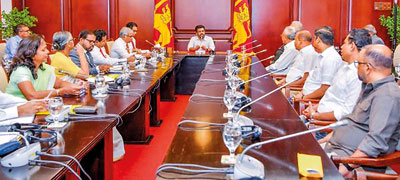
President Dissanayake and officials at a meeting with rice millers
The president instructed them to set up and update a database that would show the amount of paddy remaining with the millers, the PMD, and intermediate sellers.
The president also instructed the officials to scrutinise the pledged loans given to millers during 2023 and 2024, especially their declaration on the amount of paddy they had and the rice they produced. A directive was also issued to make the declaration of paddy stocks a condition to sanction loans in the future. 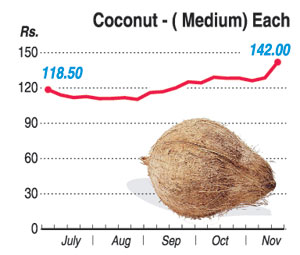
The president also agreed to the proposal made by the officials to impose a control price for paddy and rice at the beginning of the next cultivation season.
During his briefing, HARTI’s senior agriculture economist, Duminda Priyadharashana, told the president that there was no shortage of rice as there were ample stocks of paddy in the country to meet the demand for 14 months, according to the Agriculture Department database.
The previous Yala and Maha season yields were good, and therefore there was ample rice to meet the demand until March 2025, said Mr. Priyadharshana, who also took part in the meeting held between the large-scale paddy millers and the president a week before.
“How come rice shortages disappear when prices are increased and shortages are there when millers are told to sell rice at controlled prices? This means the millers have paddy, and they are trying to release it when prices are increased,” he said, adding that there was no need to import rice. 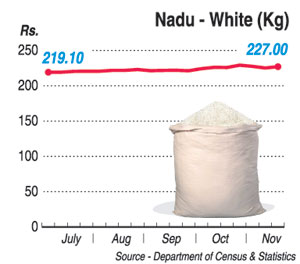
Meanwhile, a senior CAA official who did not want to be named said that the millers were planning to create an artificial shortage by slowing down rice distribution.
He said that as the PMB did not collect a buffer stock, the millers who bought paddy from farmers at a low price and gathered stocks were using the situation to their advantage and increasing prices beyond the controlled prices or slowing down the release of rice produced by them.
The official pointed out that it was essential to set up a mechanism to maintain buffer stocks of rice, big onions, and vegetables to ensure fair prices for farmers and their availability for consumers at affordable prices.
He suggested that if an artificial shortage was created, the government should, as a contingency measure, import rice, though there was plenty of rice available locally.
Meanwhile, the Coconut Cultivation Board explained that it would deploy mobile trucks in major towns to sell coconuts at Rs 110.
The board claimed it sold 5,000 nuts in the Maharagama area on Friday.
The national coconut production dropped to 2.8 billion nuts this year, a sharp decrease compared to 3.3 billion last year, according to the Coconut Growers Association of Sri Lanka (CGASL) data.
CGASL Chairman Shakila Wijewardena said the coconut price increase was a supply-demand issue.
He explained that the long-term impact of the 2021 government’s chemical fertiliser ban too contributed to the issue, crippling the industry.
“Usually, coconut cultivation takes three years for harvest, and currently we are facing this dilemma of lower yield due to bad policies taken in the past in addition to the frequent land fragmentation with rich cultivable estate lands being utilised for other purposes, bringing down overall production,” Mr. Wijewardena told the Sunday Times.
He added that annual production of coconuts in the country is “extraordinarily low” and pointed out that the ongoing migration of the workforce and unavailability of skilled workers also caused labour shortages in several areas across the country.
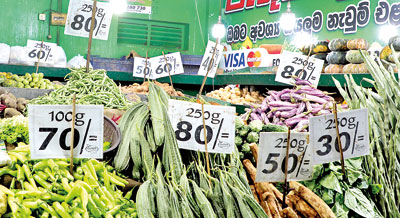
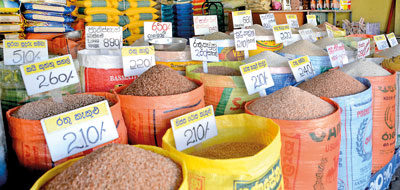
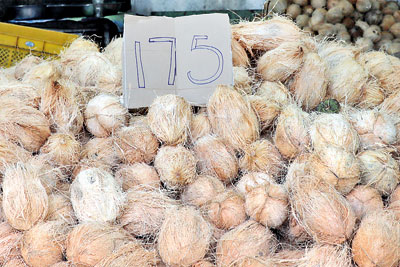
The importance of setting up a mechanism to maintain buffer stocks of rice, big onions, and vegetables to ensure fair prices for farmers and their availability for consumers at affordable prices, has been pointed out. Pix by Priyanka Samaraweera
The best way to say that you found the home of your dreams is by finding it on Hitad.lk. We have listings for apartments for sale or rent in Sri Lanka, no matter what locale you're looking for! Whether you live in Colombo, Galle, Kandy, Matara, Jaffna and more - we've got them all!

